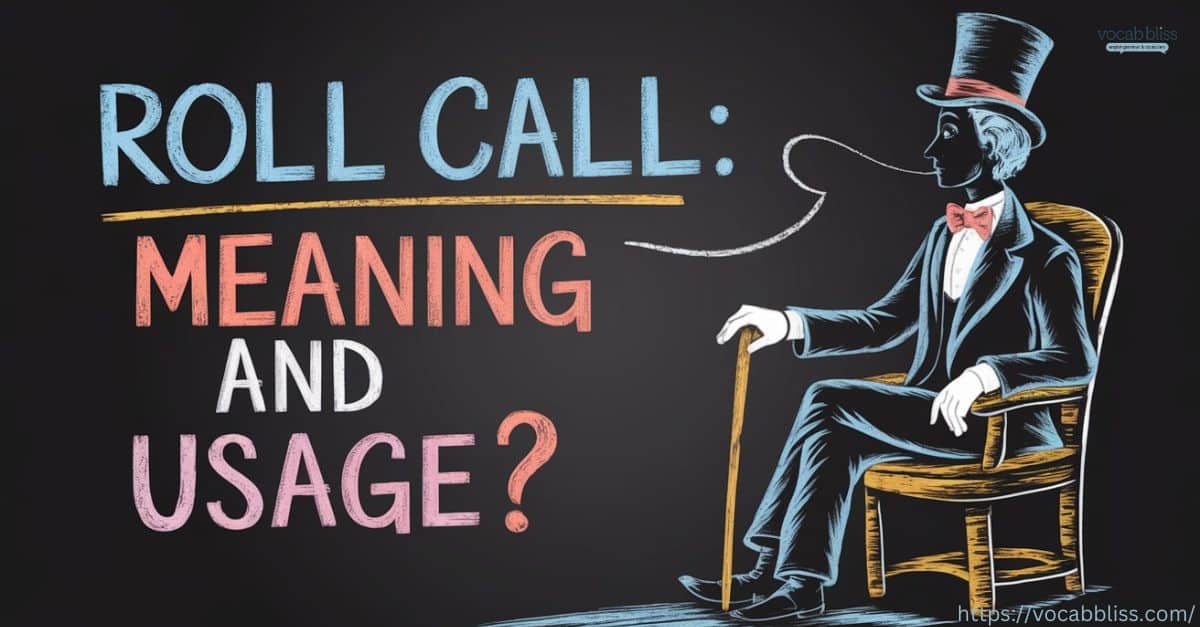Have you ever wondered if you should use “roll call” or “role call”? These words sound almost identical, leading to frequent mix-ups. Yet, they mean very different things. If you’ve ever been confused, you’re not alone—these are among the most misunderstood terms in English.
This article will dive deep into both words, explain the differences, and give you tips on using the correct terminology in context.
Understanding the Basics
Origins and History
The confusion between “roll call” and “role call” isn’t just because they sound the same; it’s rooted in their etymology. Both terms have distinct historical backgrounds, adding to their uniqueness:
- Roll Call: This term dates back to military traditions, where a list, or “roll,” of names was read aloud to confirm attendance. In fact, the term “roll” refers to a scroll or list of names. Over the years, “roll call” has become a staple in institutional settings, such as schools, workplaces, and other environments where verifying attendance is crucial.
- Role Call: While often mistaken for “roll call,” “role call” isn’t recognized as a proper term in English. The confusion stems from the word “role,” which means a function, duty, or part that someone plays in a specific context. Think of theater character roles or job responsibilities.
Why the Confusion?
The mix-up happens mainly due to similar pronunciation and spelling. When spoken quickly, “roll” and “role” are almost indistinguishable, leading to incorrect assumptions about spelling. This has caused widespread misuse in daily language usage and even in some formal documents.
Roll Call: Meaning and Usage
Definition
Roll Call is the process of reading a list of names (often alphabetically) to confirm the presence or absence of individuals. Furthermore , it’s a crucial attendance verification practice used in many scenarios, ranging from classrooms to the military..

Historical Context
- In the military, “roll call” was a critical procedure. Traditionally, soldiers’ names were read from a “roll,” a paper scroll, to confirm their presence. Consequently, this ensured military accountability, where the absence of a name signified a missing person.
- Today, the term has found its way into schools for teacher attendance checks, corporate meetings, and other settings where tracking people is essential.
Correct Usage
Roll call is the only correct way to phrase it when referring to taking attendance. Here are a few examples of how it’s used:
- “The teacher started the classroom roll call to make sure everyone was present.”
- “In the military, a daily attendance roll is crucial for maintaining accurate records.”
- “At the start of the workplace meeting, the manager did a quick roll call to see who was there.”
Examples
| Context | Correct Usage of “Roll Call” |
|---|---|
| School | “We’ll begin with the morning attendance roll.” |
| Military | “A soldier missed the morning roll call.” |
| Corporate | “Roll call was conducted to check all attendees.” |
| Theater | “A quick roll call ensured all actors were present.” |
Role Call: Is It Correct?
Definition
“Role Call” is not a standard English term, but it’s easy to see why people use it. The word “role” deals with a person’s function or duty in a given context, like taking on duties and responsibilities in a project or portraying a part in a play. When someone mistakenly uses “role call,” they may be confusing it with scenarios involving “assigning roles” or checking responsibilities.

Common Misunderstandings
The common phrase mistake of using “role call” occurs because people think it’s about calling out roles or responsibilities. But in proper English, “roll call” should be the term for verifying presence. Here’s why “role call” is incorrect:
- Correct Usage in Context: If you mean to identify if people are present, you should say “roll call,” not “role call.”
- If you’re referring to a part in a play or a job function, then “role” is appropriate but doesn’t belong with “call.”
Usage Analysis
You might encounter “role call” in writing or speech due to a misunderstanding. It’s best to stick to “roll call” for clarity. Consider these scenarios:
- Incorrect: “We did a role call to see who was present.” (Wrong)
- Correct: “We conducted a roll call to confirm attendance.” (Right)
Roll Call or Role Call: A Side-by-Side Comparison
To make things clearer, let’s compare “roll call” Vs “role call” side-by-side:
| Feature | Roll Call | Role Call |
|---|---|---|
| Correct Usage | Yes | No |
| Purpose | Confirm attendance | Not recognized term |
| Context | Schools, military, organizations | Misused for duties or roles |
| Example | “Start with a roll call.” | Incorrect: “Start with a role call.” |
| Pronunciation | Identical to “role call” | Identical to “roll call” |
Everyday Usage and Common Mistakes
Misuse in Media and Online
You’ll often see “role call” misused in newspapers, blogs, and even TV. Let’s look at why it’s a problem:
- In an article headline, “The school conducted a morning role call.” (This is incorrect.) Instead, it should read, “The school conducted a morning roll call.”
- Social Media: “We had a role call for project roles today.” (Incorrect)
Tips to Remember
Here’s how to keep the terms straight:
- Roll Call = Attendance Check: Use it for reading names to verify presence.
- Role = Duties/Functions: Use it when discussing tasks, parts, or jobs.
Memory Trick
Think of a roll of paper; similarly, a “roll call” involves reading names from a list. On the other hand, the word “role” deals with jobs and character preparation, not attendance..
Real-Life Usage Examples
Here are scenarios using the terms accurately:
- In a school, “The teacher asked students to respond with ‘present’ during the attendance roll.”
- At a theater, “Each actor reviewed their role before performing their part in a play.”
Related Words and Terms
Synonyms and Related Phrases
Here are some related terms and phrases you might find useful:
- Attendance Check: Another way to refer to “roll call.”
- Reading a List: Involves going through a name list.
- Job Responsibilities: Instead of using “role call,” use this for roles and duties.
- Organizational Procedure: A formal process to manage a roll call in corporate or institutional settings.

Word Origins and Connections
Understanding the roots of these terms helps clarify their usage:
| Word | Origin | Meaning |
|---|---|---|
| Roll | Old French | A scroll or list of names |
| Role | Old French | A part played by an actor or a duty |
FAQs
Is ‘Role Call’ Ever Correct?
No, “role call” is not correct for taking attendance. Use “roll call” to read a name list or perform an attendance check.
How Do I Correct Someone Who Misuses These Terms?
Politely explain the difference between “roll” and “role.” Share that “roll call” involves checking who’s there, while “role” is about duties and responsibilities.

Additional Resources: Roll Call Or Role Call
For further reading on the difference between these terms and how to avoid common errors, explore more on English grammar terms, correct vs. incorrect terminology, and proper usage guides.
By understanding the distinction between “roll call” and “role call,” you’ll avoid a common phrase mistake and ensure your language remains clear and professional.
Conclusion
Summary of Key Differences
In short:
- Roll Call is the correct term for verifying attendance. It’s used in schools, meetings, and other organizational contexts.
- Role Call is incorrect for attendance and should not be used in that sense. Instead, “role” refers to a part or duty someone plays.
Final Tip
Next time you’re tempted to say “role call,” just remember: if you’re reading names to check if someone is present or absent, it’s always a “roll call.” Keep your language precise for speech and writing accuracy.
Encouragement to Practice
Try using “roll call” in sentences to get comfortable with the correct context. Your ability to use the term accurately will enhance both your written and spoken communication
Read More
- Tomorrow or Tommorrow: Which One Is Correct?
- Journeys or Journies? Breaking Down the Terms
- Leafs or Leaves? Which Form to Use?
- Training or Trainning: Which One Is Correct?
- Recieve or Receive: Which One Is Correct?
- Definately Or Definitely: Clearing Up The Confusion

Jorge Phillips is an experienced blogger who writes for Vocab Bliss, sharing his passion for the English language. With a knack for simplifying complex grammar rules and a focus on commonly confused words, Jorge helps readers navigate the nuances of English with ease. His insights aim to make learning engaging and practical.







